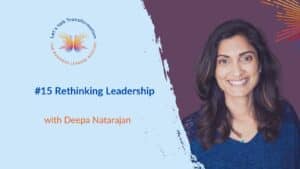“You need to use the culture to change the culture…”
In this week’s episode of let’s talk Raj and I explore the challenges of creating & leading adaptable and flexible organisations. We discuss the multi-faceted systems thinking approach as well as the more operational aspects and particularly the importance of knowing how to ‘unlearn’ and ‘relearn’, both as an individual and as an organisation. The need to frame these activities properly leads us to discuss different models, and Raj’s adaptive IT framework : looking at how strategy, organisation, culture, technology, and ways of working work intricately together across an organisation to create sustainable change.
Raj shares his wealth of insight and experience from working with organisations big and small, as well as his thought leadership on this subject.
The main insights you will get from this episode :
- COVID has highlighted how ‘digital transformation’ is actually two separate strands: digital and transformation – both have been accelerated by the pandemic, which has caused us to rethink generally
- it is essential to ask the right questions, implement the right changes, provide the requisite tools for change and start first and foremost with the people and culture of an organisation
- decision-makers must be given the technological capability to make quick decisions based on real-time data in a fast-moving world in order to pivot, react and adapt to rapid change
- transformation projects must start small, and the principles and lessons learned from them shared and customised for maximum effect in different parts of the organisation and hence for the organisation as a whole
- pragmatic change concepts take time and evolve; ‘unlearning’ and ‘relearning’ is key to shifting the mindset given that there is no ‘culture model’ sitting alongside other standard business models
- leaders must believe and invest in the concept, and accept the fluidity of work boundaries as they seek out potential amongst their staff and empower them to make decisions where they are best placed to do so
- this in turn makes people feel valued, imparts a sense of belonging and underpins a collective purpose that could well be the most powerful change agent of all









